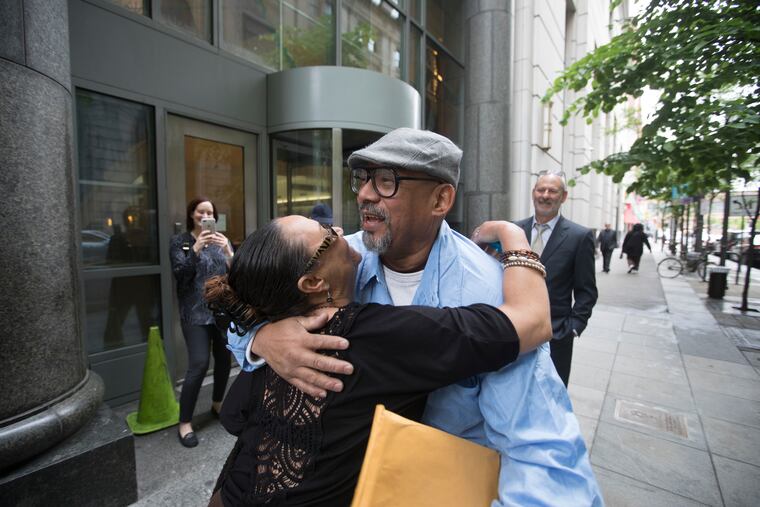Philly man freed from 28 years on death row after finding of prosecutor’s misconduct
The victim's sister said it's time for Orlando Maisonet to go home. “I believe he had nothing to do with it," she told the judge. "In my heart, I feel that.”

Gloria Figueroa, whose brother Jorge was murdered in a North Philadelphia basement in 1982, stepped sobbing in the front of a Philadelphia courtroom on Thursday morning. Then, she urged Judge J. Scott O’Keefe to release one of the men convicted of killing him — and swiftly end what she sees as a decades-long injustice compounding the tragedy of her brother’s death.
That man, Orlando Maisonet, 60, spent 28 years on death row for the murder, but always contended that two heavily armed drug dealers, Simon and Heriberto Pirela, killed Figueroa and forced Maisonet to help dispose of the body.
“I believe he had nothing to do with it, your honor," Figueroa said. "In my heart, I feel that. And I believe everyone deserves a second chance at life.”
O’Keefe agreed, and imposed the sentence negotiated by Maisonet’s lawyer, Daniel Silverman, and Assistant District Attorney Paul George: 14 to 28 years in prison plus two years’ probation for the charges of third-degree murder, conspiracy, and possession of an instrument of crime, making Maisonet eligible to be released immediately.
He’ll serve the probation in Puerto Rico, helping his 84-year-old mother rebuild her home from damage sustained in Hurricane Maria, according to Silverman.
“I think [she] is waiting to make me a mama’s boy again,” said Maisonet, a stout man with a bald head, glasses, and a salt-and-pepper goatee. “All I can say is, ‘Yes, ma’am.’”
George referred questions to a spokesperson for District Attorney Larry Krasner. The spokesperson, Benjamin Waxman, declined comment except to say, “Our office felt that today’s outcome was a just resolution of this case.”
Maisonet’s release brings to a close a nearly three-decade-long quest to shed light on what he argued — and the judge agreed — was ineffective defense, along with clear misconduct by the Philadelphia District Attorney’s Office and Roger King, the prosecutor who handled the case.
Maisonet was initially convicted of two murders involving the Pirelas, who are both serving life sentences in state prison. (Simon Pirela had been sentenced to death, but that sentence was vacated in 2004 pursuant to a Supreme Court ruling that individuals with intellectual disabilities may not be executed.)
But his first conviction — for killing pizza shop owner Ignacio Slafman — was later overturned and Maisonet was acquitted at a retrial in 2005.
The second conviction, for the murder of Figueroa, who had been a witness to Slafman’s death, was vacated 14 years later, in February.
In that case, Maisonet and his lawyers claimed that King had falsified evidence, withheld information from the defense, and failed to notify the court of possible perjured testimony. The District Attorney’s Office supported vacating the conviction, though it did not concede misconduct. Instead, the district attorney agreed that Maisonet had received inadequate legal representation, and that it had been prejudicial when King showed the jury a clip from America’s Most Wanted that included a dramatization of the crime. King died in 2016.
Maisonet agreed to a plea rather than take this case to trial.
“Since he has spent the last 28 years in a 7-by-10 box, facing imminent execution, he made the difficult decision" to take a deal," Silverman said. To him, Maisonet’s journey reflects a fundamental problem with the justice system: “It was way too easy for the state to unfairly convict Mr. Maisonet 28 years ago, and far too difficult for Mr. Maisonet to finally receive the justice he was always due.”